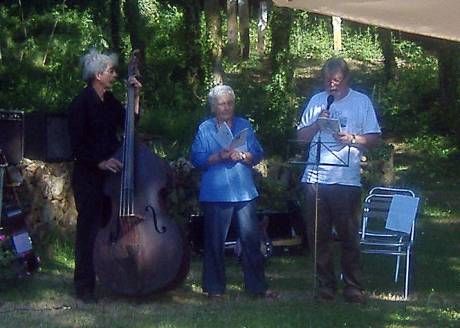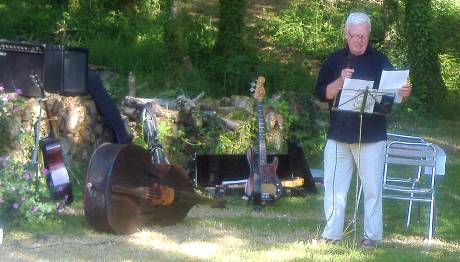Great launch of Colette Wittorski translations in Brittany
 international |
arts and media |
news report
international |
arts and media |
news report  Thursday July 08, 2010 19:12
Thursday July 08, 2010 19:12 by Western Writers' Centre - Ionad Scríbhneoirí Chaitlín Maude - WWC
by Western Writers' Centre - Ionad Scríbhneoirí Chaitlín Maude - WWC westernwriters at eircom dot net
westernwriters at eircom dot net Canavan House, Nuns Island, Galway
Canavan House, Nuns Island, Galway 087.2178138
087.2178138
Sun and an Arthurian forest lend their ambiance to great evening
Irish poets and French painters and poets mingled at "L'Autre Rive" restaurant in Huelgoat, Berrien, Brittany, for launch and readings on Saturday, June 26th.
Brittany's Huelgoat is the ancestral home of the American writer, Jack Kerouac, and a plaque on a bridge commemorates him there. A place of inspiring beauty, complete with rockfall, lake and waterfall powering an ancient mill, it also boasts bee-cultivation, festivals, and open-air operas. Hardly surprising then that the "L'Autre Rive" restaurant and bookshop in the Arthurian woods around Berrien should be chosen as the spot, in hot sunshine, to host a reading by Colette Wittorski and Fred Johnston of Colette's original French poems and Johnston's translations, published by Lapwing poetry Press as 'Northern Lights,' and Colette Wittorski's partner, Scottish-born painter and sculptor Olivier Danican, presented an exhibition of new work. The restaurant garden was full of sculptures by various artists.
There was plenty of open-air music and one of the Western Writers' Centre directors, Brian Mooney who heads up the Clare Three-Leggéd Stool writers' group, read from translations of his own work made by Colette Wittorski. Other French poets arrived, including Eve Lerner, who will read in Galway and Clare shortly. The following day saw a poet's picnic.
"It was a wonderful setting and we are thankful to everyone who helped us," said Fred Johnston, whose collection of stories translated into French by writer and film-maker Kris ar Braz will be published by Terre de Brume in October of this year. "It was really quite marvellous, and a privilege to read out my translations. When Colette read recently in Galway on her first-ever visit to Ireland, let me just say that the poetry audience of that city did not bother to show its best side. It was really, in hindsight, quite disgraceful and should have sent out a strong message to anyone who had ears to hear that Galway has a very bitter taste in its cultural mouth. I have to admit that I was a touch less than politic recently when the city's university French department contacted me looking for information on how to organise an event! I'm getting too old for nonsense. By contrast, her reading in Glór in Ennis was marvellously attended and even her books solely in French began to disappear! We were all very happy for her."


Comments (11 of 11)
Jump To Comment: 1 2 3 4 5 6 7 8 9 10 11Bon chance, écrivains!!
You mean 'Bonne chance!' Huelgoat is a gorgeous place and undiscovered by ravaging tourists so far.
It looks like a wonderful place. It has a lake, too, I understand.
When the Germanic Saxons launched an all out attack on Britain in the 6th century many Celtic Britons fled to France.
Hence the name Brittany.
But surely, it wasn't French she was speaking at such a cultural event - when Breton is their first language? I thought all Bretons hated the French, certainly the ones I met hated the French - they wanted their own country independent and totally separate from France and they certainly did not regard themselves as French. Perhaps, it is a mistake, nonetheless, I love to hear news of Brittany as I lived there for awhile in the early 90s, and they were all so fond of gaelic culture.
When I lived in Tréguier, Brittany, the people I was staying with were always asking me to play the tin whistle and flute, and the Breton cultural nights were great craic altogether with the equivalent of sean-nós singing in the Breton language - it was so soulful and powerful to hear, I'll never forget it (I really miss those days).
Some Bretons may hate the French but not all. You now about the 'red strip' in Brittany? Then there are Breton nationalists, of course, and the memory of the Breton youths sent out to fight in the Great War is alive on village tombstones. But all Southern Irish do not hate the British. And 'hate' is such a strong word. Certainly they do not like Sarkozy! The French nowadays do no more than the English, that is they come in and buy up Breton cottages as summer homes. But many English head home leaving the mortgages unpaid. I would be careful about stereotyping the Bretons, as the Irish have so often been stereotyped. Even with the advent of the admirable 'diwan' schools the Breton language is spoken as a first language only in small pockets of the country and dare I say, elderly pockets, for the most part. As here with Irish, there are of course families who would've brought their children up with Breton. There would be many more Irish speakers here than Breton speakers there on a speak-it-every-day basis. But the comparison with here is interesting: if you ceased tomorrow to speak English altogether, or refused to, and spoke only Irish, your life-spectrum would contract considerably. The Breton folklorist and historian Anatole le Braz visited Ireland at the beginning of the 20th century and met many political and cultural figures in Dublin; his view was that the Irish should work WITH the English and not against them! Bretons have very little direct provable genetic link with the Irish - the Galicians on the other hand have a very strong one, and our 'Song of Amergin' originated in Northern Spain.
As for the other 'commentator' above who seems to save up everything I write (I don't know whether they have a sexual fantasy or not, to be honest) one must try hard to understand how a note about a gig in Brittany could be perceived as an attack on writers in Galway!!!! The name given of course is not a real name, and I would lay odds the real author is a man who has done the pseudonym trick before now.
I didn't realise that the people of Brittany regarded the Irish as being closer relatives than the French until I went to a concert by the Breton musician Alan Stivell in the 1970s.
Thankfully he is still alive and well and playing his Celtic music:
http://en.wikipedia.org/wiki/Alan_Stivell
I remember those glorious Stivell gigs, for me it was The Stadium in Dublin. Stivell, whose father made a 'Celtic' harp, studied harp music in Edinburgh and was for a time a journalist. Certainly he was responsible for introducing Breton music to Ireland in a big way; but there was a re-awakening of Breton consciousness going on (the dances, for instance, hadn't been performed anywhere in the country for decades, if not longer) and publishers also were coming along, such as 'Terre de Brume' and others, and magazines such as Hopala! This re-awakening did happen to an arguable extent on the back of our own music and culture revival and so much was happening that way in the 'Sixties and 'Seventies anyway. The 'Celtic' union of Brittany and Ireland is a tad more idealistic, but that's fine and the cross-cultural influences in music have provided some great Breton and Irish talent. But the Bretons are much closer to the Welsh than to ourselves, who have a direct affinity with the Gallegos of Northern Spain. Not that any of that matters, of course, because the interchange of cultural thinking has led to cultural expansion all round. Stivell plays and records, his later work becoming increasingly experimental and his 'glass' harp a little hard to take. Dan ar Bras, his guitar-player of old, has produced many albums of his own now. The ageing Morvan brothers represent the old rural singing-for-dancing style. Go online and look 'em up.
Alan Stivell played in the Royal Festival Hall on the south side of the Thames in 1975(Now there's posh.)
I was dragged there by a Breton workmate of mine on London Transport who always refused to be called French.
The music was excellent
When Stivell wished for a political union of all the peoples of the Celtic Fringe of Europe we all clapped.
But all of us knew that pigs might fly first.
He attracts gigantic crowds still in Brittany and in the rest of France.
http://www.youtube.com/watch?v=nS496XPDZ6A
Colette Wittorski, Fred Johnston and Brian Mooney reading at Huelgoat, Berrien, Brittany, recently.
Indymedia Ireland is a media collective. We are independent volunteer citizen journalists producing and distributing the authentic voices of the people. Indymedia Ireland is an open news project where anyone can post their own news, comment, videos or photos about Ireland or related matters.